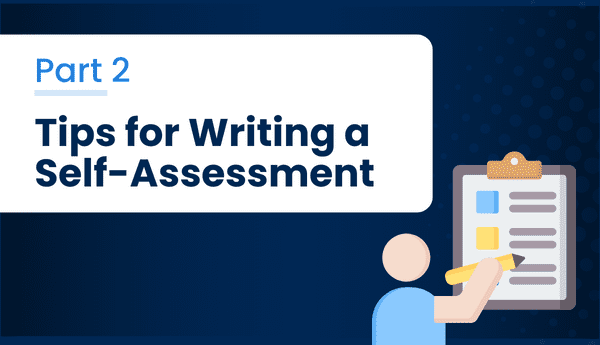We’re our own worst critics. But we don’t have to be – with these few tips, you can write your finance job self-assessment that’s at once honest and flattering.
Writing a finance job self-assessment can be a tricky thing to nail. It’s not easy to describe your obvious accomplishments and value to your employer, as well as identify your possible limitations and areas for growth, without sounding too immodest or unduly harsh. That’s why we’re offering some tips on how to write a finance job self-assessment, so that you can make the most of the professional self-performance review process. But because everyone can always use some extra advice, here are more hints for writing a self-assessment at your finance job.
A finance job self-assessment is a chance to emphasize your people-related impact
The importance of technical know-how and strengths can’t be overstated. But the reality is that employers are placing even greater significance on so-called soft skills. Having an aptitude for leadership, being a strong public speaker and communicator, and finding fulfillment in your work with a perpetually positive and upbeat attitude – these are all traits that many employers increasingly value.
That said, don’t just talk about your individual technical prowess. Describe the various ways you’ve supported individuals on your team, or the team as a whole. For example, recount how you helped a co-worker at your finance job complete a project, or encouraged the team to bond and learn new skills by organizing a workshop. These kinds of activities can often go unrecognized; the self-assessment, then, is a great opportunity for you to earn credit for them. Mention this work and elaborate on the impact it’s had on the other people you work with.
Self-assessments are also an opportunity to mention your “extracurricular” work
Letting your employer see everything you’re doing in the name of your work, whether it’s in your official job description or not is a major element of the finance job self-assessment. Your bosses will appreciate that you’re not only willing to do what’s explicitly required of you, but that you regularly go above and beyond your immediate tasks.
…don’t just talk about your individual technical prowess.
So if you’ve ever voluntarily worked overtime, taken on or helped out with special projects or assignments after work, gotten involved in a corporate social responsibility or volunteer venture, or even just organized an after-work social event, be sure to include an account in your finance job self-assessment. All of these things demonstrate that you’re committed to improving the way the company operates and the way you do your finance job – that you’re not just maintaining the status quo. Not only will your employer conclude that you’re worth keeping around – they may start warming up to the idea of offering you that promotion or raise you’ve been angling for.
Elicit feedback from co-workers to help you prepare
It’s not easy to honestly and soberly evaluate yourself; that’s part of what makes a finance job self-assessment so challenging. A few trusted colleagues, however, can shed some light and offer an objective opinion on how you rate as a co-worker. Pull one or two people aside (separately), and ask them for some honest feedback on what you do well in your finance job, that is, what makes you a valuable worker, what challenges you’ve overcome. Chances are that they’ve noticed things about your work habits that you haven’t been cognizant of yourself.
If you’re feeling bold and you have a strong relationship with your colleagues, ask them to point out some of your weaknesses or limitations. It’s also helpful to ask a mentor, as they’ll have monitored your progress and observed your approach with challenges, setbacks, and obstacles. If you don’t already have a mentor, start looking for one now!
A major element of the finance job self-assessment: letting your employer see everything you’re doing in the name of your work, whether it’s in your official finance job description or not.
Be honest – but positive – about where you need to improve
It might be trite, but honesty is the best policy where performance reviews are concerned. To put it simply, you should never lie, or even simply exaggerate the truth, on a self-assessment. Among other things, you risk being caught, in which case you will appear untrustworthy to your employers; that could easily put your job in jeopardy and have them considering whether they need to let you go.
It’s important, then, to be honest about the areas of your finance job that you feel you need to work on (especially if you need help or support from your employer). But that doesn’t mean you have to frame these issues in a defeatist manner. You should disclose the elements of your job that you’ve struggled with, and acknowledge your lesser skill, experience, or output. Frame these latter, however, not as conclusive realities, but as opportunities for growth. Show that you are eager to improve on these areas, and suggest concrete strategies for doing so – whether through professional development, job shadowing, or mentorship. Strike a positive tone throughout your self-critique: indicate that you feel positive about your ability to improve, so as to inspire confidence in your employer that you will.
Writing about yourself with self-awareness and confidence, while being honest about your weaknesses, can be a tricky dance. But so long as you put in the time and effort, and aren’t afraid to consult with others where you’re stuck, you should be able to emerge quite happily from the other side of this process with a detailed and well-reasoned performance review that will aid both you and your employer.
What are some things you’ve done to help you write a finance job self-assessment that identifies your value to your organization? Share your ideas in the comments!
Let us know what you think! At Clarity Recruitment, we’re always interested in hearing from accounting and finance professionals like yourselves, who are ready for new, exciting opportunities that can take their careers to the next level. And be sure to follow us on LinkedIn for more great tips and advice!





